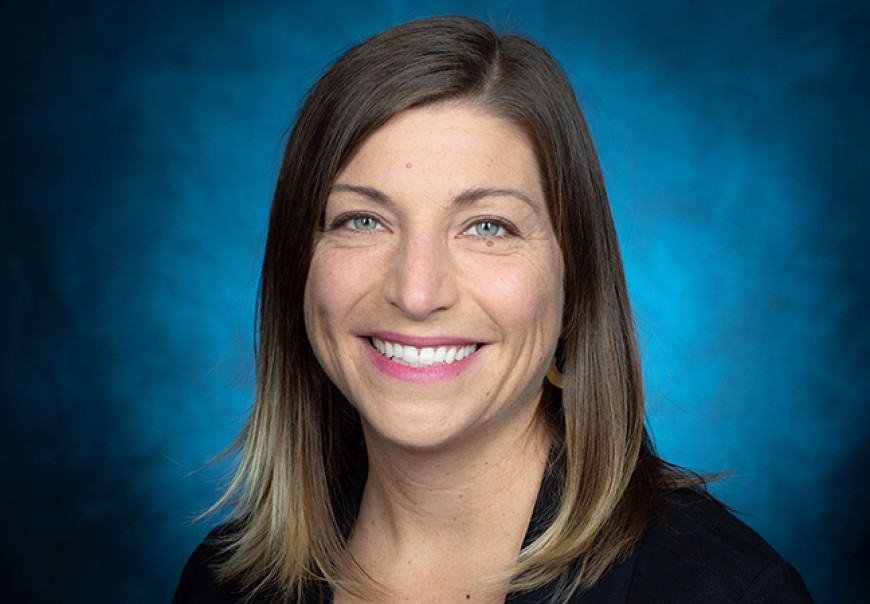
 back to all news
back to all news
Sara Hughes named CIGLR's associate director

Sara Hughes, an associate professor at the University of Michigan School for Environment and Sustainability (SEAS), has been named the Associate Director of the Cooperative Institute for Great Lakes Research (CIGLR).
Hosted by SEAS, CIGLR consists of a Research Institute and a Regional Consortium that is a partnership between the National Oceanic and Atmospheric Administration (NOAA), universities, nongovernmental organizations, and businesses. Together, they work to achieve environmental, economic, and social sustainability in the Great Lakes.
Hughes has been on the U-M faculty since 2019, where she directs the Water and Climate Policy Laboratory and has served as a member of the SEAS PhD Program Committee; the SEAS Diversity, Equity, and Inclusion Communications and Diverse Voices Sub-committee; and the University of Michigan Water Center’s Steering Committee.
Prior to joining the faculty at Michigan, Hughes served as an assistant professor in the Department of Political Science at the University of Toronto, and as a postdoctoral fellow at the U.S. Environmental Protection Agency and the National Center for Atmospheric Research. Her expertise in environmental policy and environmental justice will complement CIGLR’s existing strengths in natural science. She studies water and climate policymaking processes and outcomes, including both the drivers of policy (politics and incentives, organizational capacities and constraints, and environmental conditions) and the effects of policy (environmental outcomes, justice and equity, impacts at other levels of government). Her work has been supported by research grants from numerous agencies including the National Science Foundation and the Social Science and Humanities Research Council (Canada).
“I am excited to work with the scientists at CIGLR and NOAA to identify opportunities to ask and answer meaningful research questions that incorporate social science perspectives,” Hughes said. “This kind of interdisciplinary research can forward our understanding of the drivers of environmental challenges in the Great Lakes and identify opportunities for effective and equitable solutions.”
Hughes has enthusiastically engaged with CIGLR in several ways: as a member of the Council of Fellows, a Co-PI on CIGLR’s renewal proposal, an applicant to CIGLR’s partner programs, a collaborator in advising SEAS master’s projects, and a speaker at CIGLR’s Great Lakes Seminar Series. Together with Casey Godwin and Mike Shriberg (National Wildlife Federation), Hughes will be supervising a CIGLR Postdoctoral Fellow (2022-2023) focused on evaluating and developing recommendations for resilience and equity metrics that can be used to guide future investments in Great Lakes ecosystems and communities through the Great Lakes Restoration Initiative (GLRI). Hughes’ leadership and expertise will be valuable to CIGLR’s science programs, including mentoring postdocs and research scientists, coordinating research efforts of the Regional Consortium, developing new research directions, and identifying new funding opportunities.
“My goal is to find opportunities to build social science capacities and insights that complement and support the great work already happening in CIGLR and NOAA,” she said, “and to foster stronger connections between CIGLR science and policymakers at the local, state, regional, and national levels.”
In her role as associate director, Hughes will expand CIGLR’s social science research footprint within her field and more broadly, thus amplifying CIGLR’s societal impact. “I am absolutely delighted for Professor Hughes to join CIGLR,” said Gregory Dick, CIGLR director. “Her expertise in social science, environmental justice, and water policy will bring valuable new dimensions to our work on the Great Lakes.”
Some initial research focus areas include identifying effective and equitable financing models for Great Lakes infrastructure and communities; strengthening collaboration in HABs management and governance; and building coastal resilience and climate adaptation in the region. Hughes also brings a strong interest in supporting CIGLR’s DEI initiatives. “Building diversity, equity, and inclusion into everything CIGLR does — from hiring decisions to research priorities to training opportunities — will strengthen our science and relevance to society.”

